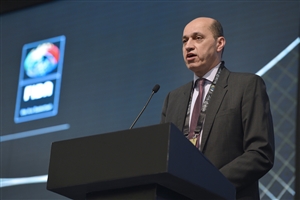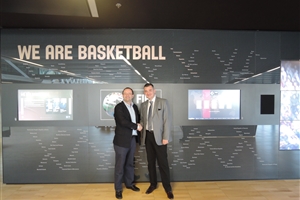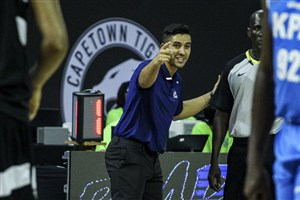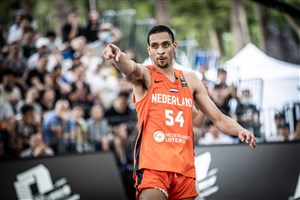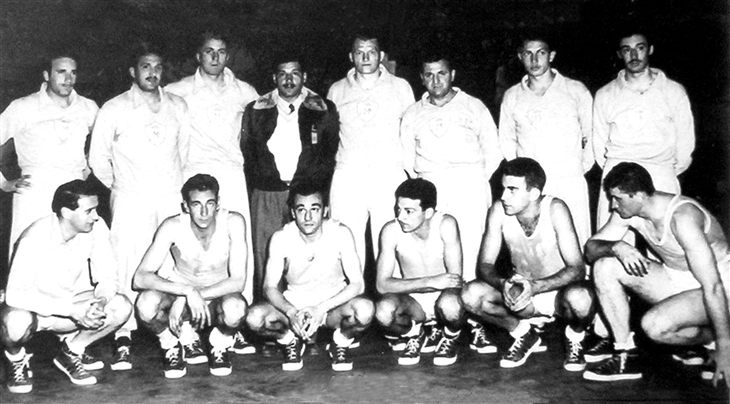
Uruguay's Basketball Federation celebrates 100th anniversary
MONTEVIDEO - The 19th of March, 2015, is a very important day in Uruguayan sport.
It's a day that marks the 100th anniversary of the Uruguayan Basketball Federation (FUBB).
Salud FUBB !! pic.twitter.com/aVz5TECn3s
— Álvaro Butureira (@alvarobutureira) March 19, 2015
In their century of basketball, the Uruguayan men have played at seven Olympics and at seven FIBA Basketball World Cups.
Twelve times, Uruguay have been crowned the winners of the South American Championship.
So on this day marking 100 years of the FUBB, it's time to celebrate the managers, coaches and players that have been able to raise the Uruguayan flag to the top, and also those who have worked in basketball and of course, the fans.
It is our duty to remember our more than extraordinary sporting past. - Castillo
"(It's our duty to) honor those who made it possible, and give credit and maintain our commitment to the future of our athletes (players, managers, referees) to enable them to work efficiently and with enthusiasm for the future of Uruguayan basketball," said FUBB president Luis Castillo.
Basketball got its start in Uruguay in 1912, 21 years after the sport was invented by James P. Naismith, when a group of members of the Asociacion Cristiana de Jovenes (ACJ) created the Uruguay Basket Ball Club. At that time, the National Commission of Physical Education created an institution to handle and organize tournaments and encourage the practice of sport.
On 19 March, 1915, the Union de Sociedades de Basket Ball was born.
Then on 12 October that same year, the Plaza de Deportes No. 3 opened and on it was played the first friendly game on an open court between the ACJ and Uruguay BBC.
On 21 August, 1921, the Union de Sociedades of Basket Ball was renamed the Uruguayan Federation of Basket Ball (FUBB).
The first champions crowned under the official FUBB name was the Club Atletico Atenas in the federal tournament, a club competition that was held until 2003.
The most successful club in that league was Sporting with 16 titles.
That outfit, which merged with Defensor club and became Defensor Sporting Club, won the last federal championship in 2003.
Other champions were Welcome (nine), Olimpia and Cordon (eight), Aguada (seven), Penarol (six), Bohemios (five), Tabare (five) and Atenas (five, three of which were in the FUBB and two in the USBB), Goes (for), Bigua (three), Hebraica Maccabi (three) and Nacional (two). Stockolmo, Trouville and Union Atletica captured one title apiece.
From 2003 onwards, with the aim of unifying the basketball from the interior of the country with that of the capital Montevideo, the Uruguayan League was created.
There are famous stories about Uruguayan basketball on the international scene.
In 1936, when basketball became an Olympic sport, Uruguay was among the nine teams that competed.
The team travelled by ship from South America to Europe, a journey that lasted a month.
The players were not idle during that time.
They were able to practice onboard as a basket had been erected.
After docking and going to Berlin, Germany, Uruguay, who were led by Leandro Gomez Harley, took sixth place.
South America's other representatives at those Summer Games, Brazil, came in ninth.
The "Celeste" would end up competing in seven Olympic Games, claiming bronze medals in Helsinki in 1952 and in Melbourne in 1956.
In Finland, the battle for bronze was held on 1 August when the Uruguayans faced South American neighbors Argentina.
Despite the loss of Nelson Demarco to five fouls with more than nine minutes remaining, Uruguay maintained a comfortable lead and won, 69-58, to reach the podium.
Adesio Lombardo led Uruguay with 23 points.
Four years later in Australia, Uruguay won their first three games in the group stage, beating Bulgaria 70-65, Formosa 85-62 and Korea 83-60.
In the Quarter-Finals, they defeated the Philippines, 79-70, but fell 66-62 to France.
In the next phase, following a 101-38 defeat to the United States, Uruguay ended up with a game against France to determine third place.
This time, the South American team prevailed, 71-62, with Oscar Moglia pouring in 25 points.
Uruguay have not reached the podium of a FIBA Basketball World Cup, a tournament they hosted in 1967.
There have been some famous wins for Uruguay, including in recent times.
In 2013 at the FIBA Americas Championship, Uruguay contributed to powerhouse Brazil's early exit when they beat them, 79-73.
FIBA President Horacio Muratore paid tribute to the FUBB on their 100-year anniversary, saying: "We extend our congratulations to everyone who has helped to keep the federation in relevance, good standing and growth within our sport, from its first president, Mr. Frederick Crocker in 1915 to the current president Mr. Luis Castillo in his successful management.
"On behalf of FIBA and its 215 Member Federations, we wish for the Uruguayan Basketball Federation to continue the great legacy and tradition they have brought to international basketball and have many more successes in the 2015 and in years to come."
Presidents of the Uruguayan Basketball Federation
1915 – Federico Crocker
1916 – Orestes Volpe
1917 – Jose Pigni
1918 – Jose Rodriguez Pacios
1919 – Hector Danero
1922 – Juan Lagomarsino
1930 – Pablo Luis Perazzo
1934 – Carlos Rivieri Podestá
1937 – Hector Paysse Reyes
1938 – Raul Blengio Salvo
1939 – Jose Martinelli Gómez
1940 – Hugo Mendes Schiaffino
1942 – Ruano Fournier
1946 – Juan Aldo Siccardi
1948 – Hugo Mendez Schiffino
1950 – Francisco Figueroa Serantes
1951 – Jose Chavez Miranda
1952 – Francisco Figueros Serantes
1955 – Pablo Pesce Barcelo
1957 – Washington Fradiletti
1960 – Justo J. Orozco
1964 – Omar Freire
1965 – Alberto Casal
1966 – Alberto Rossello
1981 – Federico Slinger
1997 – Ernesto Pereyra
1998 – German Paz
2002 – Luis A. Castillo (Current President)
Federal Championships - Union of Societies of Basket Ball - Champions:
1915: A.C.J.
1916: Plaza de Deportes Nº3
1917: Asociación Uruguaya de Sports
1918: Sporting Club del Uruguay
1919: Club Atlético Atenas
1920: Club Atlético Atenas
Uruguayan League:
From 2003 onwards, the way the championship was played in the first division was modified, with the intent of unifying the basketball from the interior of the country with that of the capital Montevideo.
League Champions:
2003 - Defensor Sporting Club
2004-2005: Salto Uruguay
2005 – 2006: Trouville
2006 – 2007: Club Malvin
2007 – 2008: Club Bigua
2008 – 2009: Club Bigua
2009 – 2010: Defensor Sporting Club
2010 – 2011: Malvin
2011 – 2012: Hebraica Macabi
2012 – 2013: Club Atlético Aguada
2013 – 2014: Club Malvín
2014 – 2015: En disputa.
Uruguay in Olympics Games
1936: Berlin (6th)
1948: London (5th) - Top Olympic Scorer: Adesio Lombardo (URU)
1952: Helsinki (3rd) - Top Olympic Scorer: Adesio Lombardo (URU)
1956: Melbourne (3rd) - Top Olympic Scorer: Oscar Moglia (URU)
1960: Rome (8th)
1964: Tokyo (8th)
1984: Los Angeles (6th) - Olympic Scorer: Horacio Lopez (URU)
The "Celeste" bronze
During these 100 years of the Uruguayan Basketball Federation there are two pages that will forever have a special meaning, the bronze medals at the Olympic Games of Helsinki 1952 and 1956 Melborne.
Helsinki 1952
Roster: Martin Acosta Lara, Enrique Balino, Victorio Cieslinskas, Hector Costa, Nelson Demarco, Hector Garcia, Tabare Larre Borges, Adesio Lombardo, Roberto Lovera, Sergio Matto, Wilfredo Pelaez and Carlos Rosello. Head Coach: Olguiz Rodriguez.
Melbourne 1956
Roster: Carlos Blixten, Ramiro Cortes, Hector Costa, Nelson Chelle, Manuel Gadea, Adolfo Lubnicki, Sergio Matto, Raul Mera Ebers, Washington Poyet, Waldemar Rial, Milton Scaron and Edison Ciavattone. Head Coach: Héctor López Reboledo.
Uruguay in FIBA Basketball World Cups
1954: Rio de Janeiro, Brazil (6th)
1959: Santiago de Chile, Chile (9th)
1963: Rio de Janeiro, Brazil (10th)
1967: Montevideo, Uruguay (7th)
1970: Yugoslavia (7th)
1982: Colombia (11th)
1986: Madrid, Spain (18th)
Uruguay in South American Championships
Uruguay occupies an important place in the history of the oldest basketball championship winning a total 12 times. The team has lifted the trophy in 1930 (Montevideo), 1932 (Santiago), 1940 (Montevideo), 1943 (Lima), 1947 (Brazil), 1949 (Assumption), 1953 (Montevideo), 1955 (Cucuta), 1969 (Montevideo), 1981 (Montevideo), 1995 (Montevideo) and 1997 (Maracaibo).
Sudamericana
At club level, the Uruguayan delegation also learned to climb to the top posing as South American champions in the following editions:
1946: Olimpia
1956 and 1958: Sporting
1983: Penarol
1992 and 2008: Biguá
FIBA

